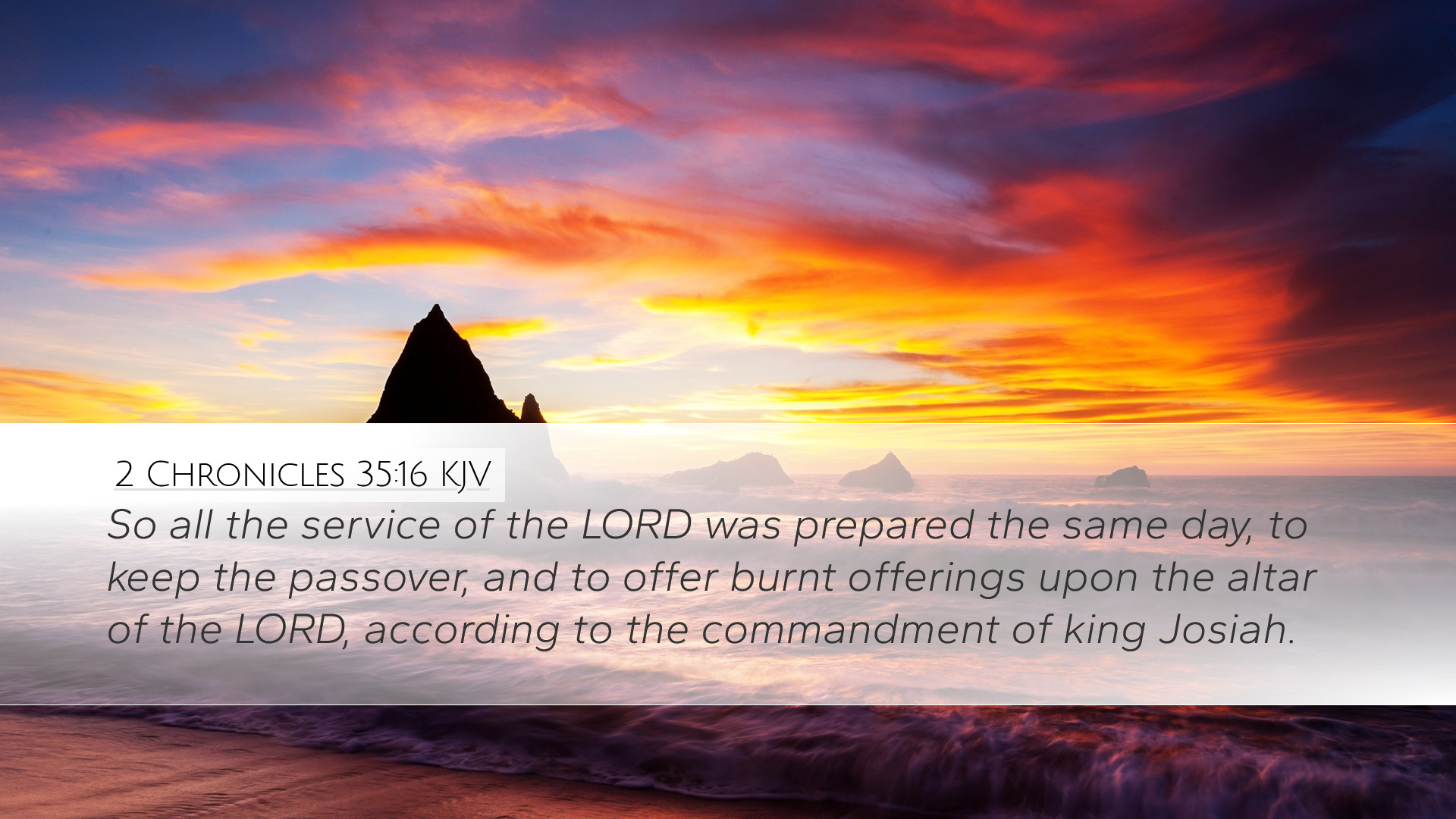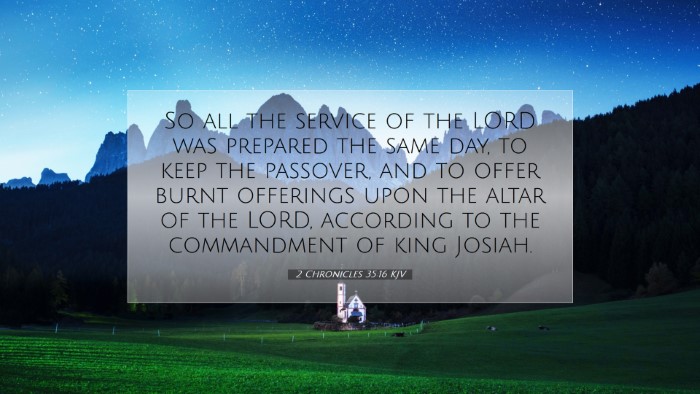Commentary on 2 Chronicles 35:16
Verse Context: 2 Chronicles 35:16 states, "So all the service of the LORD was prepared the same day, to keep the Passover, and to offer burnt offerings upon the altar of the LORD, according to the commandment of King Josiah." This verse highlights the meticulous preparations made for the observance of the Passover under King Josiah's reign, emphasizing the importance placed on proper worship and adherence to God's commandments.
Overall Meaning
This passage reflects the zeal of King Josiah in restoring true worship in Judah. He recognizes the significance of the Passover as a covenant observance that connects the people of God to their identity and heritage. The preparation of all service on the day of the Passover demonstrates the unity and commitment of the people to obey God's laws.
Historical Context
The reign of Josiah, particularly highlighted in 2 Chronicles, marks one of the last significant attempts to restore worship and righteousness in Judah prior to its impending downfall. Josiah’s initiatives come after a long period of idolatry and neglect of the temple, as noted in the historical narratives of the Kings. His discovery of the Book of the Law reignites a national revival, propelling efforts to cleanse the nation from idolatry and refocusing their attention on worshiping Yahweh.
Insights from Public Domain Commentaries
Matthew Henry's Commentary
Matthew Henry emphasizes the importance of observance and the spirit in which it is carried out. He notes that the “service of the LORD was prepared” indicates a sense of urgency and clarity in the people’s actions. Henry also reflects on how the successful execution of the Passover reinforces communal identity among the Israelites, as they collectively engage in this sacred tradition. The verse demonstrates that when leadership is aligned with God's commands, as seen in Josiah’s dedication, the people respond positively, resulting in a vibrant, worshipful atmosphere.
Albert Barnes' Notes on the Whole Bible
Albert Barnes offers an analytical perspective, stating that this preparation signifies more than mere ritual; it was a reestablishment of covenant loyalty. Throughout the narrative, he points out how Josiah's meticulous planning and leadership serve as a model for conducting sacred rites with integrity. Barnes further notes that the obedience to God's command in relation to the Passover reflects a community working together in faith, where the king serves as the catalyst for renewal and reform in worship practices.
Adam Clarke's Commentary
Adam Clarke provides a theological interpretation that focuses on the symbolism of the Passover as a foreshadowing of Christ’s redemptive work. He explains that the burnt offerings are meaningful as acts of atonement, which signify restoration and reconciliation with God. Clarke emphasizes how the diligence and reverence with which the people partake in the Passover signal a returning heart towards God, resonating with the themes of repentance and renewal throughout Scripture. He also highlights the importance of collective worship, invoking the idea that honoring God is a communal endeavor that transcends individual participation.
Theological Implications
- Restoration of Worship: The passage illustrates a return to authentic worship, highlighting the impact of leadership on spiritual life.
- Covenant Observance: It reminds readers of the significance of adhering to God’s commandments as central to the covenant relationship.
- Unity in Worship: This shared observance fosters communal identity and integrity among the people of God.
- Foreshadowing Redemption: The Passover as a symbol ties into the broader narrative of salvation history leading to Christ.
- Service and Preparedness: The emphasis on preparation speaks to the need for diligence and reverence in one’s approach to God.
Conclusion
2 Chronicles 35:16 serves as a powerful reminder to modern believers about the importance of sacred observance, community worship, and fidelity to God’s word. The reverence with which the Passover is approached reflects the character of a people restored in their relationship with God through their king's commitment to righteousness. For pastors, students, and theologians, this passage continues to urge an authentic pursuit of holiness and a vibrant community life anchored in God’s love and commands.


